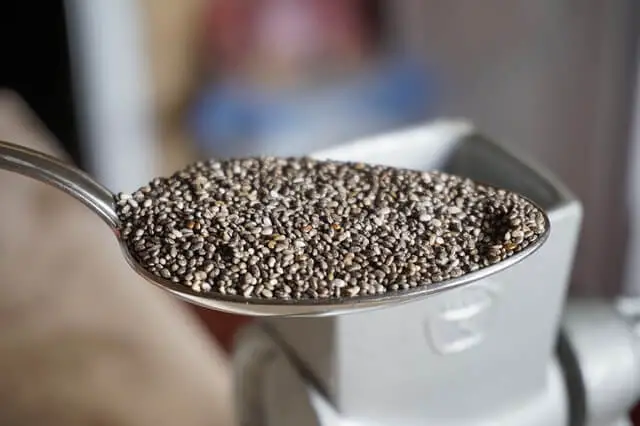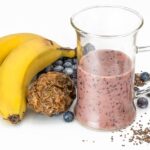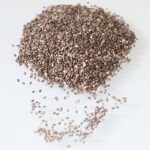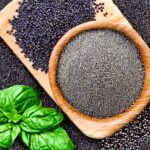
Chia seeds have become a popular health food in recent years, thanks to their high fiber, protein, and healthy fat content, and many women also use them to help lose weight. Also, many women include chia seeds in their diet for their potential health benefits. However, like any food, chia seeds can cause side effects in some individuals.
In this post, we will look at any possible side effects from chia seeds that might affect females that they should be aware of. We will also look at how to reduce the chance of these side effects.
Are there Side Effects of Chia Seeds in Females?
Although chia seeds are generally a safe food to consume, there are some things to watch out for and be aware of if you are a female.
One of the most common side effects of consuming chia seeds is bloating, gas, and constipation. Chia seeds are high in fiber, and if consumed in large quantities or too quickly, they can lead to these digestive issues. This is particularly true for women who are not used to consuming high-fiber foods.
To minimize the risk of bloating and other digestive side effects, it is important to start with a small serving of chia seeds (as little as 1 teaspoon per day) and gradually increase your intake as your body becomes accustomed to them. Additionally, be sure to drink plenty of water and consider soaking the seeds in water or another liquid before consuming them to help soften them and make them easier to digest. (See How Much Chia Seeds Should You Eat a Day)
Another potential side effect for women is that chia seeds can interfere with mineral absorption. Chia seeds contain phytic acid, a compound that can interfere with the absorption of iron, zinc, and calcium, which can lead to deficiencies of these essential minerals. This is particularly true for women who are already at risk of iron-deficiency anemia due to heavy menstrual bleeding. It’s important to consult with a healthcare professional before adding chia seeds to the diet in this case.
Furthermore, women who are pregnant or breastfeeding should be cautious when consuming chia seeds. While chia seeds are a good source of omega-3 fatty acids, which are important for fetal and infant brain development, they can also contain high levels of alpha-linolenic acid, which can affect blood clotting and increase the risk of bleeding. It’s important to talk with a healthcare professional before consuming chia seeds during pregnancy and breastfeeding.
Additionally, chia seeds are high in calories, and consuming large amounts can lead to weight gain. This is something to be mindful of for women who are trying to manage their weight.
Another potential side effect for women is that, like any food that contains fiber, chia seeds can act as a natural laxative, leading to diarrhea in some cases, especially if consumed in high amounts or too quickly. This can be uncomfortable and can also lead to dehydration if water is not consumed in sufficient amounts.
It’s worth noting that these side effects are generally mild and can be avoided or minimized by consuming chia seeds in appropriate amounts and being mindful of how your body responds to them.
Lastly, as chia seeds are high in fiber, consuming them in large quantities could also cause a feeling of fullness and could lead to poor appetite and malnutrition, especially in vulnerable individuals.
In summary, chia seeds are generally considered to be safe and healthy, but they can cause some side effects in some women. These include bloating, gas, constipation, interference with mineral absorption, bleeding risk for pregnant and breastfeeding women, weight gain, and diarrhea if consumed in large amounts. (If concerned, see also Dangers of Chia Seeds – What to Be Aware Of for more things to be aware of, including chia seeds’ side effects on the thyroid for certain individuals)
To minimize these side effects it’s important to start with a small serving, gradually increase the intake, chew the seeds well, drink enough water, and pay attention to how your body responds to them. Additionally, women who are pregnant, breastfeeding or have certain medical conditions should consult with a healthcare professional before adding chia seeds to their diet.
How Much Chia Seeds to Eat Per Day?
The recommended serving size of chia seeds is generally around 2 tablespoons (about 28 grams) per day. This is equivalent to about 12 grams of fiber. This serving size provides a good balance of the many health benefits that chia seeds offer, without overconsumption which could cause negative side effects. (See How Much is Too Much Chia Seeds Per Day?)
Additionally, it’s important to note that chia seeds contain a lot of fiber and if consumed in high amounts, it can cause digestive issues like bloating, gas, and constipation. Therefore, it’s important to increase your consumption of chia seeds gradually, to let your body get used to the fiber intake. (If you are trying to lose weight, see How Much Chia Seeds Per Day to Lose Weight)
It’s also important to pay attention to other sources of fiber in your diet, as consuming too much fiber from all sources can also cause digestive issues. It’s essential to maintain a balanced diet, including a variety of fruits, vegetables, whole grains, and lean proteins, to ensure you’re getting all the nutrients your body needs.
It’s also recommended to consult with a healthcare professional, particularly if you have specific health conditions or are pregnant or breastfeeding, before adding any new food supplement to your diet, including chia seeds. They can help you determine the appropriate serving size for your individual needs and help you monitor for any potential side effects.
In summary, the recommended serving size of chia seeds per day is 2 tablespoons (about 28 grams) which corresponds to 12 grams of fiber. It’s important to increase consumption gradually, pay attention to other sources of fiber in your diet and to consult with a healthcare professional before adding chia seeds to your diet.
Video Resources
- The Right Amount of Chia Seeds to Eat Per Day
- How Much Chia Seeds to Eat for Health, Omega-3s, Constipation & More
Lance has been passionate about the plant-based diet and we have been following a whole food plant-based diet for over 5 years. We focus on health, natural healing, weight management, animal rights, and the health of the planet and environment by focusing on whole plant-based foods and sustainable practices.
Learn more at the About Me page and follow on social media at the links below.






